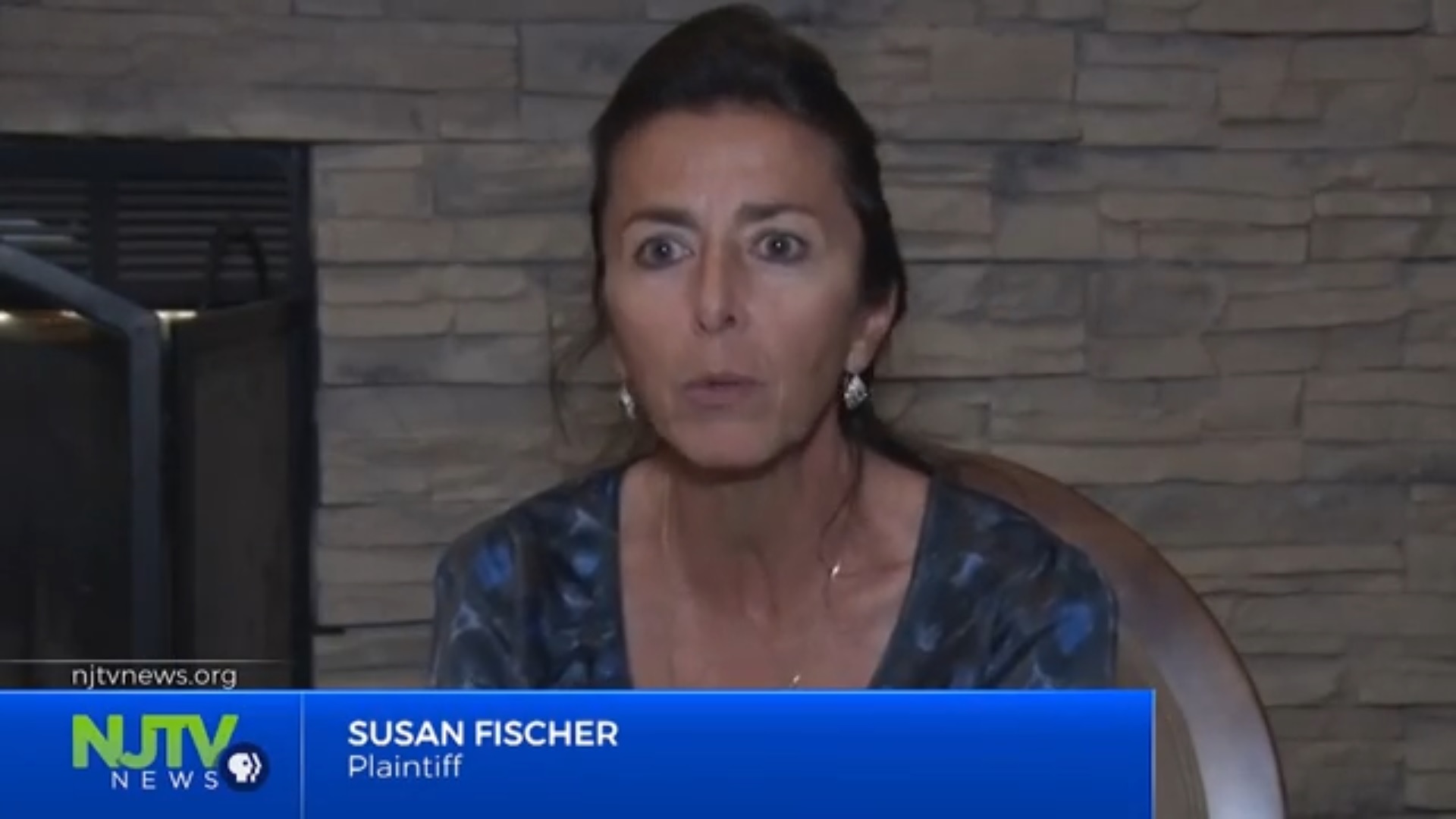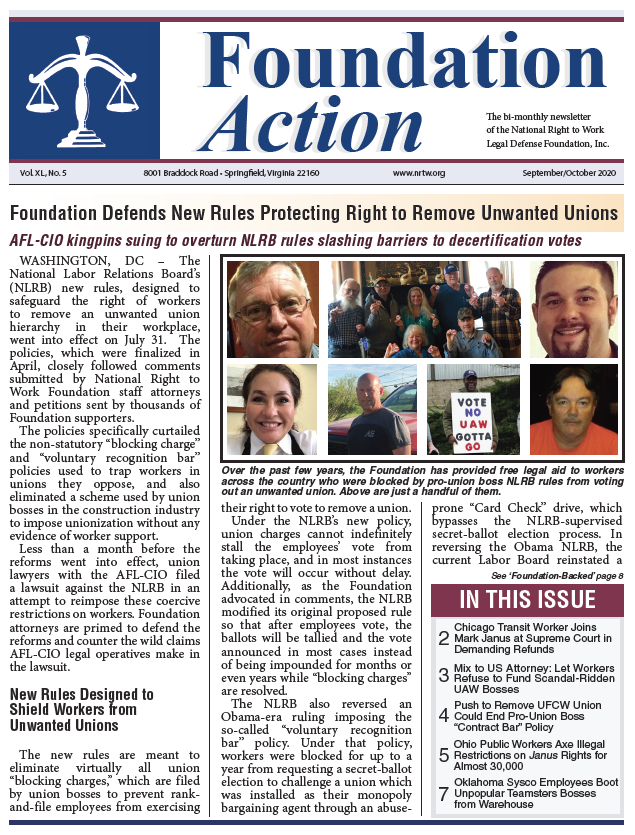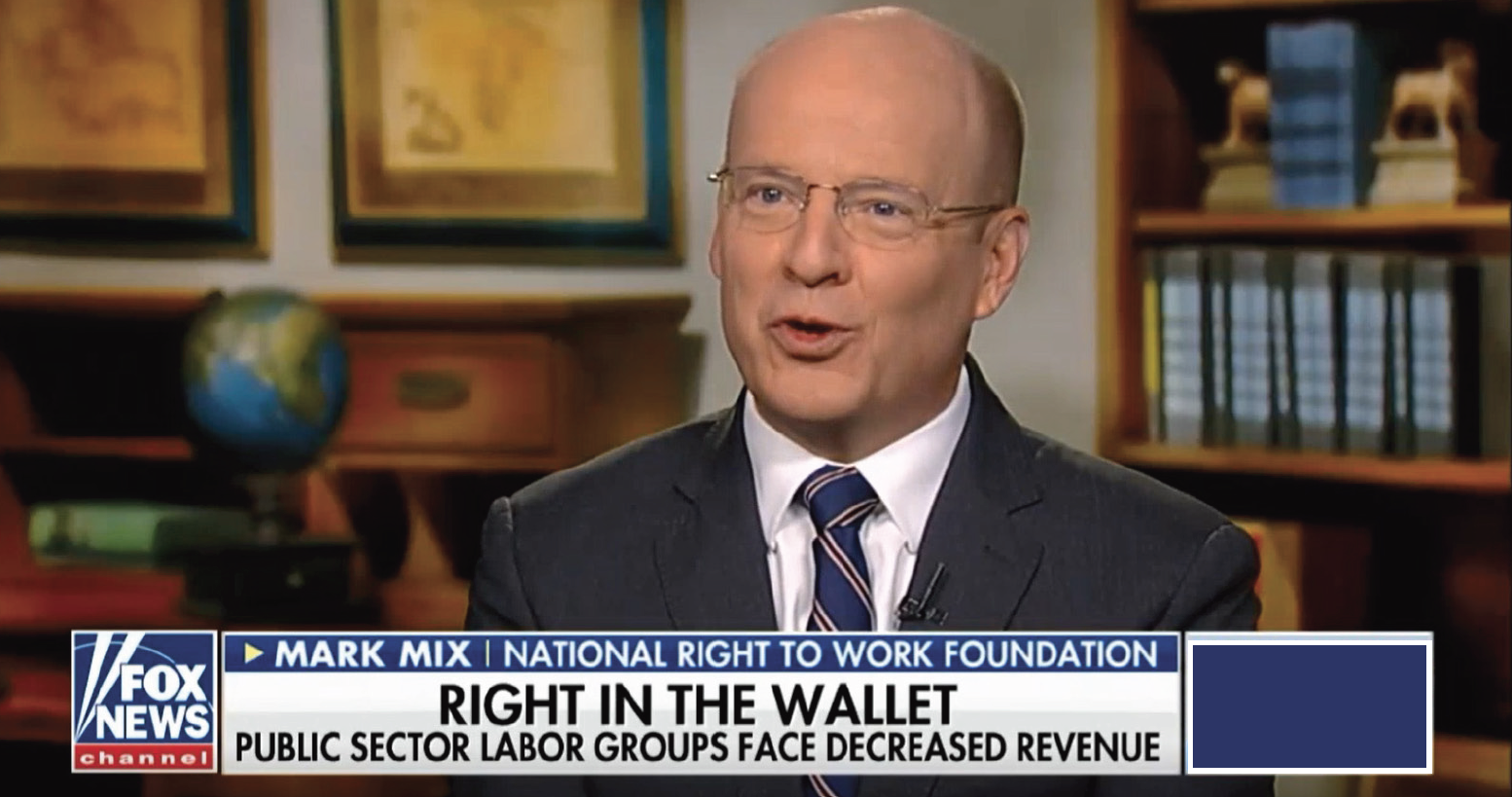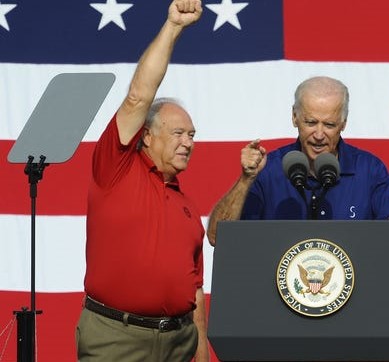Airline Workers Ask Appeals Courts to Invalidate Union Dues Opt-Out Schemes
The following article is from the National Right to Work Legal Defense Foundation’s bi-monthly Foundation Action Newsletter, November/December 2020 edition. To view other editions or to sign up for a free subscription, click here.
Cases challenge requirement that workers opt out of union political spending or else pay full dues
Just “plane” wrong: United Airlines fleet service employee Arthur Baisley (left) and JetBlue Airways pilot Christian Popp (right) are fighting to end schemes that deduct union political expenses out of workers’ paychecks without their consent.
NEW ORLEANS, LA – With free legal representation from National Right to Work Legal Defense Foundation staff attorneys, two airline workers have filed cases challenging union boss policies that require workers to opt out in order to exercise their First Amendment right not to fund union political activities, as recognized in the Foundation-argued 2018 Janus v. AFSCME Supreme Court decision.
The two federal class-action lawsuits were brought for United Airlines fleet service employee Arthur Baisley and JetBlue Airways pilot Christian Popp. They are currently pending in the U.S. Courts of Appeals for the Fifth and Eleventh Circuits respectively.
Workers Challenge Compelled Political Speech
Baisley’s case against the International Association of Machinists (IAM) union has been fully briefed and is tentatively set for oral argument the week of November 30. Meanwhile, the opening brief for Popp’s case against the Air Line Pilots Association (ALPA) union was filed in early October.
The lawsuits contend that under Janus and the 2012 Knox v. SEIU Supreme Court cases — both argued and won by Foundation staff attorneys — no union dues or fees can be charged for union political activities without a worker’s affirmative consent.
Despite this, union officials at the IAM and ALPA enforce complicated opt-out policies that require workers to object to funding union political activities or else pay full union dues. Foundation staff attorneys argue that the Janus decision’s opt-in requirement applies to airline and railroad employees covered by the Railway Labor Act (RLA), taken together with longstanding precedent protecting private sector workers from being required to pay for union political and ideological activities.
Mr. Baisley and Mr. Popp both work in Right to Work states (Texas and Florida, respectively), but the RLA preempts state law. Consequently, they can be forced to pay union dues or fees or be fired. Even under the RLA, however, union bosses cannot legally force workers to pay for political activities.
Cases Could Expand Janus Protections to Private Sector
The lawsuits argue IAM and ALPA’s opt-out policies are designed to trap unwilling participants into full dues in violation of their First Amendment rights. This forces workers to subsidize union political activities against their will, including the part of full dues that union officials use to support their radical political agenda and handpicked candidates for office.
“IAM and ALPA union officials have demonstrated a blatant disregard for the rights of the very workers they claim to represent by creating complicated obstacles for independent-minded workers who want to exercise their right not to fund union ideological activities,” said National Right to Work Foundation Vice President Patrick Semmens. “Although Janus’ biggest impact was to secure the First Amendment rights of all public employees across the nation not to be required to fund Big Labor, these cases demonstrate that Janus’ implications can also protect the rights of private sector workers.”
Appeals Court Upholds Foundation Victory against Forced Dues for Lobbying
The following article is from the National Right to Work Legal Defense Foundation’s bi-monthly Foundation Action Newsletter, November/December 2020 edition. To view other editions or to sign up for a free subscription, click here.
Decade-long NLRB battle results in Appeals Court win for Rhode Island nurse
After fighting since 2009, Rhode Island nurse Jeanette Geary triumphed over UNAP union bosses in September 2020. Her victory at the First Circuit let stand an NLRB decision that declares no worker can be forced to fund any union lobbying.
BOSTON, MA – Longtime Rhode Island-based nurse Jeanette Geary has again prevailed in a legal battle waged for over a decade by United Nurses and Allied Professionals (UNAP) union bosses, who seek to force her to fund union lobbying as a condition of keeping her job.
Geary, who worked as a nurse at Kent Hospital in Warwick, Rhode Island, filed an unfair labor practice charge in 2009 against the UNAP union with free legal aid from National Right to Work Legal Defense Foundation staff attorneys. She filed charges after the union forced her and other employees to pay for union lobbying activities, and also failed to provide evidence of a legally required independent audit of its breakdown of expenditures.
Foundation-Won Legal Precedents Cited
In the 1988 Foundation-won Beck case, the United States Supreme Court ruled that private sector workers in states without Right to Work protections could be forced to pay some union fees as a condition of employment, but those fees could not be used for political activity like lobbying.
Despite this, the NLRB had decided against Geary in 2012, but that decision was invalidated by the Supreme Court’s holding in NLRB v. Noel Canning that the Board lacked a valid quorum because of two unconstitutional “recess appointments” then-President Obama had made. Five years later, Geary’s case was the only remaining case invalidated by Noel Canning still pending a decision by a valid NLRB panel.
In January 2019, Foundation staff attorneys filed a mandamus petition at the U.S. Court of Appeals for the District of Columbia Circuit seeking a court order that the NLRB promptly decide Geary’s case. The Appeals Court then ordered the NLRB to respond to that petition by March 4, 2019.
NLRB Ruled Workers Can Never Be Forced to Fund Union Lobbying
The NLRB issued its decision on March 1 of that year, just ahead of the deadline. In its decision, the NLRB ruled 3-1 that union officials ivities. It also ruled that union officials must provide verification that the union expenses they charge to non-members have been independently audited.
Unwilling to stop forcing workers to fund lobbying activities, UNAP union bosses asked the First Circuit Court of Appeals to overturn this ruling. Oral arguments were held in March 2020 before a panel of three judges at the First Circuit Court of Appeals, including retired Supreme Court Justice David Souter, with veteran Foundation staff attorney Glenn Taubman arguing for Geary.
Appeals Court: Precedents Dictate Full Ban on Forced Dues for Lobbying
The court’s ruling not only upheld the NLRB’s decision in favor of Geary, it determined that a blanket ruling against charging non-member workers for union lobbying was the only solution that could be justified given various Supreme Court rulings, including cases brought by Foundation staff attorneys, about what workers can be forced to fund.
“In a long-overdue victory, Ms. Geary has successfully affirmed the right not to fund any union boss lobbying, a protection guaranteed by the Foundation-won Beck Supreme Court decision,” commented National Right to Work Foundation Vice President and Legal Director Raymond LaJeunesse. “No worker should be forced to pay for any union political activity, including lobbying. But, the fact that Ms. Geary had to endure this drawn out legal fight shows why Right to Work protections are needed for all employees, so individual workers can decide whether to subsidize union boss activities, political or not.”
Foundation Urges NLRB to Protect Workers’ Privacy from Union Organizers
The following article is from the National Right to Work Legal Defense Foundation’s bi-monthly Foundation Action Newsletter, November/December 2020 edition. To view other editions or to sign up for a free subscription, click here.
Comments filed to end Obama-era rule forcing disclosure of workers’ private information
UPS driver Rod Carter was stabbed by Teamsters militants for providing for his family during a strike, after receiving late-night threats on his home phone number.
LANSING, MI – Relying on arguments presented by a National Right to Work Legal Defense Foundation legal brief, a federal court has denied an injunction against a new Michigan Civil Service Commission (MiCSC) rule designed to protect state workers’ First Amendment Janus rights.
The amicus brief was filed after lawyers from several major Michigan unions sued to overturn the protections, which block dues seizures ruled unconstitutional in the 2018 Right to Work Foundation-won Janus v. AFSCME Supreme Court decision.
The rule was finalized by MiCSC in July, following detailed comments submitted by the Foundation. The arrangement alters the state’s union dues deduction system to require the affirmative and knowing consent of workers before dues can be taken from their paychecks, as per the Court’s First Amendment standard laid out in Janus.
Michigan Public Servants Will Get Yearly Nudge About Janus Rights
MiCSC will now remind Wolverine State public servants annually that they have a right not to subsidize union bosses’ activities. Further, state employees who still want to have dues deducted must annually confirm that they want to waive that right and are voluntarily authorizing union dues deductions from their paychecks.
Under the new rule, union bosses are not able to siphon dues or fees from the paychecks of employees who aren’t aware of their right not to pay union dues, or on the basis of years-old dues authorization forms that may not reflect current consent.
In September of 2019, Alaska Gov. Mike Dunleavy signed an executive order creating similar Janus protections for Alaska state employees. Foundation staff attorneys are currently representing an Alaskan state vocational instructor seeking to enforce his First Amendment rights under Janus and that order. Additionally, Texas Attorney General Ken Paxton and Indiana Attorney General Curtis Hill both issued legal opinions earlier this year, urging public employers to notify employees that they have a First Amendment right to refuse to fund a union unless they opt in to such payments. This follows a Wall Street Journal op-ed last year by Foundation President Mark Mix and staff attorney William Messenger, which encouraged states to take action to proactively defend employees’ rights under the landmark decision. Messenger argued and won Janus before the Supreme Court.
New Jersey Teachers Battle Union-Backed Rights Restriction
The efforts by states to implement Janus rights safeguards come as public workers across the country continue to challenge schemes which block them from exercising their Janus rights outside a brief, union-created “escape period,” which is often just a few days a year, or even once every three years. New Jersey teachers Susan Fischer and Jeanette Speck are defending their rights and the rights of their fellow educators in a class-action case against the New Jersey Education Association (NJEA), now pending before the U.S. Court of Appeals for the Third Circuit. Fischer and Speck attempted to exercise their right to cut off dues to the union just days after the Supreme Court recognized this right in Janus. Union-label politicians, anticipat-ing the High Court’s ruling, had enacted a state law the month before Janus was decided, cutting the time a public servant could exercise his or her Janus rights down to just 10 days per year. Oral arguments in the case took place in late September with Foundation staff attorney William Messenger arguing the case before a three-judge panel. If Fischer and Speck’s lawsuit is successful, educators across New Jersey will be free to cut off dues at any time, and the state law limiting those rights to a 10-day window would be struck down as unconstitutional. Additionally, Fischer, Speck and their coworkers who also sought to exercise their Janus rights would get refunds of all dues that were extracted from their paychecks under the unconstitutional arrangement.
Decorated Las Vegas Officer Defends Her First Amendment Janus Rights
Elsewhere in the country, Las Vegas police officer Melodie DePierro sued both the Las Vegas Police Protective Association (PPA) union and the Las Vegas Metropolitan Police Department (LVMPD) for illegally seizing union dues from her paycheck using such an “escape period” scheme.
According to her complaint filed by Foundation staff attorneys in the U.S. District Court for the District of Nevada, in January 2020 she sent letters to both union officials and the LVMPD resigning her membership and requesting a stop of all union dues deductions. Her complaint reports that union and police department agents rejected that and a later request, citing a “narrow escape period between October 1 and October 20 each year.”
DePierro, in addition to bravely asserting her rights, stands up for her community. The Las Vegas Review-Journal reported that she helped protect a hospital during the October 2017 mass shooting at the Route 91 Harvest music festival in Las Vegas, springing into action despite being off-duty.
“Officer DePierro has an exceptional history of keeping Las Vegas safe. Instead of respecting her First Amendment Janus rights, PPA union bosses have decided to impose an unconstitutional policy on her just to keep her hard-earned money rolling into their coffers,” commented National Right to Work Foundation Vice President Patrick Semmens. “Fortunately, more and more states are beginning to grow wise to the fact that union boss-devised traps are widespread, and as such are moving to secure their public servants’ Janus rights.”
Foundation Defends MI Rule, Public Servants Nationwide from Anti-Janus Schemes
The following article is from the National Right to Work Legal Defense Foundation’s bi-monthly Foundation Action Newsletter, November/December 2020 edition. To view other editions or to sign up for a free subscription, click here.
Union officials sued to overturn Foundation-backed rule creating opt-in system for union dues
“That was so un-American to us,” New Jersey teacher Susan Fischer told NJTV News of forced union fees in 2018. Two years after Janus, she is still fighting to remove illegal union boss-created restrictions on Janus rights in the state.
LANSING, MI – Relying on arguments presented by a National Right to Work Legal Defense Foundation legal brief, a federal court has denied an injunction against a new Michigan Civil Service Commission (MiCSC) rule designed to protect state workers’ First Amendment Janus rights.
The amicus brief was filed after lawyers from several major Michigan unions sued to overturn the protections, which block dues seizures ruled unconstitutional in the 2018 Right to Work Foundation-won Janus v. AFSCME Supreme Court decision.
The rule was finalized by MiCSC in July, following detailed comments submitted by the Foundation. The arrangement alters the state’s union dues deduction system to require the affirmative and knowing consent of workers before dues can be taken from their paychecks, as per the Court’s First Amendment standard laid out in Janus.
Michigan Public Servants Will Get Yearly Nudge About Janus Rights
MiCSC will now remind Wolverine State public servants annually that they have a right not to subsidize union bosses’ activities. Further, state employees who still want to have dues deducted must annually confirm that they want to waive that right and are voluntarily authorizing union dues deductions from their paychecks.
Under the new rule, union bosses are not able to siphon dues or fees from the paychecks of employees who aren’t aware of their right not to pay union dues, or on the basis of years-old dues authorization forms that may not reflect current consent.
In September of 2019, Alaska Gov. Mike Dunleavy signed an executive order creating similar Janus protections for Alaska state employees. Foundation staff attorneys are currently representing an Alaskan state vocational instructor seeking to enforce his First Amendment rights under Janus and that order. Additionally, Texas Attorney General Ken Paxton and Indiana Attorney General Curtis Hill both issued legal opinions earlier this year, urging public employers to notify employees that they have a First Amendment right to refuse to fund a union unless they opt in to such payments. This follows a Wall Street Journal op-ed last year by Foundation President Mark Mix and staff attorney William Messenger, which encouraged states to take action to proactively defend employees’ rights under the landmark decision. Messenger argued and won Janus before the Supreme Court.
New Jersey Teachers Battle Union-Backed Rights Restriction
The efforts by states to implement Janus rights safeguards come as public workers across the country continue to challenge schemes which block them from exercising their Janus rights outside a brief, union-created “escape period,” which is often just a few days a year, or even once every three years. New Jersey teachers Susan Fischer and Jeanette Speck are defending their rights and the rights of their fellow educators in a class-action case against the New Jersey Education Association (NJEA), now pending before the U.S. Court of Appeals for the Third Circuit. Fischer and Speck attempted to exercise their right to cut off dues to the union just days after the Supreme Court recognized this right in Janus. Union-label politicians, anticipat-ing the High Court’s ruling, had enacted a state law the month before Janus was decided, cutting the time a public servant could exercise his or her Janus rights down to just 10 days per year. Oral arguments in the case took place in late September with Foundation staff attorney William Messenger arguing the case before a three-judge panel. If Fischer and Speck’s lawsuit is successful, educators across New Jersey will be free to cut off dues at any time, and the state law limiting those rights to a 10-day window would be struck down as unconstitutional. Additionally, Fischer, Speck and their coworkers who also sought to exercise their Janus rights would get refunds of all dues that were extracted from their paychecks under the unconstitutional arrangement.
Decorated Las Vegas Officer Defends Her First Amendment Janus Rights
Elsewhere in the country, Las Vegas police officer Melodie DePierro sued both the Las Vegas Police Protective Association (PPA) union and the Las Vegas Metropolitan Police Department (LVMPD) for illegally seizing union dues from her paycheck using such an “escape period” scheme.
According to her complaint filed by Foundation staff attorneys in the U.S. District Court for the District of Nevada, in January 2020 she sent letters to both union officials and the LVMPD resigning her membership and requesting a stop of all union dues deductions. Her complaint reports that union and police department agents rejected that and a later request, citing a “narrow escape period between October 1 and October 20 each year.”
DePierro, in addition to bravely asserting her rights, stands up for her community. The Las Vegas Review-Journal reported that she helped protect a hospital during the October 2017 mass shooting at the Route 91 Harvest music festival in Las Vegas, springing into action despite being off-duty.
“Officer DePierro has an exceptional history of keeping Las Vegas safe. Instead of respecting her First Amendment Janus rights, PPA union bosses have decided to impose an unconstitutional policy on her just to keep her hard-earned money rolling into their coffers,” commented National Right to Work Foundation Vice President Patrick Semmens. “Fortunately, more and more states are beginning to grow wise to the fact that union boss-devised traps are widespread, and as such are moving to secure their public servants’ Janus rights.”
Full Foundation Action September/October 2020 Newsletter Now Online
All articles from the September/October issue of Foundation Action are now on the website.
In this issue:
- Foundation Defends New Rules Protecting Right to Remove Unwanted Unions
- Chicago Transit Worker Joins Mark Janus at Supreme Court in Demanding Refunds
- Mix to US Attorney: Let Workers Refuse to Fund Scandal-Ridden UAW Bosses
- Push to Remove UFCW Union Could End Pro-Union Boss “Contract Bar” Policy
- Ohio Public Workers Axe Illegal Restrictions on Janus Rights for Almost 30,000
- Oklahoma Sysco Employees Boot Unpopular Teamsters Bosses from Warehouse
Recent articles can be found here. To sign up for a free copy of the newsletter via mail please see the form at the bottom of this page.
Ohio Public Workers Axe Illegal Restrictions on Janus Rights for Almost 30,000
The following article is from the National Right to Work Legal Defense Foundation’s bi-monthly Foundation Action Newsletter, September/October 2020 edition. To view other editions or to sign up for a free subscription, click here.
Foundation-backed lawsuit ends AFSCME bosses unlawful “escape period” scheme
Two years after Foundation staff attorneys won Janus, public sector workers continue to cast off the shackles of forced union dues. In Allen, the plaintiffs successfully defended the Janus rights of thousands of Ohio public workers.
COLUMBUS, OH – A lawsuit by four Ohio public employees has secured the end of an illegal dues deduction scheme used by Ohio Civil Service Employees’ Association (OCSEA/AFSCME Council 11) union bosses to block an estimated 28,000 workers from exercising their First Amendment right to stop union dues payments. The workers obtained free legal representation from National Right to Work Foundation staff attorneys in challenging the policy.
The class-action suit, Allen v. AFSCME, challenged OCSEA’s so-called “maintenance of membership” policy, which trapped workers in forced-dues payments except for a brief “escape period” once every three years at the expiration of the union monopoly contract. The workers argued this policy violated their First Amendment rights under the Janus v. AFSCME Supreme Court decision.
In Janus, the High Court struck down mandatory union fees for public sector workers as an infringement of their First Amendment rights, and ruled that the government can only deduct union dues or fees with an individual’s affirmative consent.
After Freeing Workers, Foundation Attorneys Warn of Future Union Boss Tricks
As a result of the lawsuit, OCSEA officials and the State of Ohio have rescinded the “maintenance of membership” restriction on when state workers can exercise their First Amendment right to cut off union dues deductions.
They must also honor requests to stop dues deductions from any employees who signed the AFSCME dues authorization form at issue in the lawsuit. Finally, AFSCME bosses repaid dues seized illegally under the scheme to the plaintiffs and more than 150 other employees who tried to cut off union dues deductions after Janus was decided.
Knowing that union bosses don’t easily give up in their crusades to coerce workers into paying dues, however, Foundation staff attorneys issued a legal notice shortly after the case wrapped up, warning workers that OCSEA union bosses may soon solicit them to sign new dues deduction forms which are not covered by the litigation. The new forms will “purport to restrict” when employees can stop dues, it warns.
In light of that, the notice reminds workers that under Janus, no Ohio public employee can be forced to sign a union dues deduction form as a condition of employment, no matter what union agents may tell them.
Just Latest in String of Ohio Worker Victories over “Escape Periods”
Allen is not the only case in which Ohio public employees have, with National Right to Work Foundation legal aid, successfully challenged union boss attempts to limit their rights.
Seven other Ohio public employees won the first-in-the-nation victory against unconstitutional “escape periods” with Foundation aid in January 2019, after they filed a class-action federal lawsuit challenging a similar policy created by AFSCME Council 8 bosses. They won a settlement ending the restrictions for themselves and their coworkers. That win was followed by two other Ohio public workers, Connie Pennington and Donna Fizer, successfully ending “escape period” restrictions with Foundation assistance later in 2019.
“Although this chain of victories for Buckeye State public employees is certainly encouraging, the widespread nature of these schemes shows there remains much work to do to force union bosses to end their unconstitutional restrictions on public employees’ First Amendment Janus rights,” observed National Right to Work Foundation President Mark Mix. “Foundation litigation has already freed hundreds of thousands of public employees from forced union dues, but likely millions more remain trapped and unable to exercise their rights. That is why Foundation litigators will continue to file these cases.”
Push to Remove UFCW Union Could End Pro-Union Boss “Contract Bar” Policy
The following article is from the National Right to Work Legal Defense Foundation’s bi-monthly Foundation Action Newsletter, September/October 2020 edition. To view other editions or to sign up for a free subscription, click here.
Non-statutory NLRB policy hinders workers’ right to vote out an unwanted union
 Employees at the Selbyville, DE, Mountaire Farms plant rally to vote out unpopular UFCW honchos from their workplace, as union lawyers scramble to block the workers’ votes from being counted.
Employees at the Selbyville, DE, Mountaire Farms plant rally to vote out unpopular UFCW honchos from their workplace, as union lawyers scramble to block the workers’ votes from being counted.
WASHINGTON, DC – The National Labor Relations Board (NLRB) has announced that it will review the so-called “contract bar” doctrine, which prevents employees from exercising their right to vote an unpopular union out of their workplace for up to three years if union officials and their employer have finalized a monopoly bargaining contract.
This is the latest development in a case by a Selbyville, Delaware-based Mountaire Farms poultry employee, Oscar Cruz Sosa, against the United Food and Commercial Workers (UFCW) Local 27 union. Cruz Sosa submitted a petition in February for a vote on whether Local 27 should be removed as monopoly bargaining agent in his workplace. The petition was signed by hundreds of his coworkers, more than the percentage required to trigger such a vote.
Worker Obtains Foundation Help after Union Attempts to Block Vote
After he submitted the petition, UFCW bosses immediately claimed that the “contract bar” should block Cruz Sosa and his coworkers from even having an election, because the monopoly bargaining agreement between Mountaire and the union had been signed less than three years earlier.
Cruz Sosa then obtained free legal assistance from National Right to Work Foundation staff attorneys in defending his and his coworkers’ right to vote. With Foundation aid, he also hit UFCW agents with federal unfair labor practice charges for imposing an illegal forced-dues clause on the workplace and threatening him after he submitted the petition.
When the NLRB Regional Director in Baltimore heard the election case, he ruled that the union contract contains an unlawful forced-dues clause that mandates workers immediately pay union dues upon hiring or be fired. Under NLRB precedent, an illegal forced-dues clause means the “contract bar” cannot apply, allowing the vote to proceed.
UFCW’s Desperate Attempt to Block Vote Triggers NLRB Review of “Contract Bar”
Despite the longstanding precedent supporting the Regional Director’s ruling, UFCW union lawyers filed a Request for Review, asking the full NLRB to reverse the Regional Director and halt the election.
In response, Cruz Sosa’s Foundation staff attorneys opposed the union’s efforts to block the vote. They also argued that, if the Board were to grant the union’s Request for Review, it should also reconsider the entire “contract bar” policy, which has no statutory basis in the NLRA. The Foundation’s legal brief noted that the “contract bar” runs counter to the rights of workers under the NLRA, which explicitly include the right to vote out a union a majority of workers oppose.
Just hours after the voting process in the decertification election had begun, the NLRB issued its order granting the union’s Request for Review, while also accepting the Foundation’s request to reconsider the entire “contract bar” doctrine. The order noted “that it is appropriate for the Board to undertake in this case a general review of its ‘contract bar’ doctrine.”
Given the precedential import of this case, the NLRB solicited amicus briefs on whether the “contract bar” should be allowed to stand. UFCW officials, still desperate to throw a wrench in Cruz Sosa and his coworkers’ effort to vote them out, demanded that the NLRB rescind its request for amicus briefs in the case, but that effort was quickly rebuffed.
“We urge the NLRB to swiftly overturn this outrageous non-statutory policy, which lets union bosses undermine for up to three years the free choice of workers that is supposed to be at the center of federal labor law,” commented National Right to Work Foundation Vice President and Legal Director Raymond LaJeunesse. “The very premise of the NLRB-created ‘contract bar,’ that union bosses should be insulated from worker decertification efforts, is completely backwards.”
LaJeunesse added: “Union officials across the country use all types of tactics to get workers into unions but rely on government power and legal tricks to prevent them from getting out.”
Mix to US Attorney: Let Workers Refuse to Fund Scandal-Ridden UAW Bosses
The following article is from the National Right to Work Legal Defense Foundation’s bi-monthly Foundation Action Newsletter, September/October 2020 edition. To view other editions or to sign up for a free subscription, click here.
Letter exhorts worker-empowering reforms as part of potential federal takeover of UAW
Democratic presidential candidate Joe Biden, seen here with former UAW top boss Dennis Williams, is promising UAW officials the power to extract forced dues from every auto worker under their monopoly power.
DETROIT, MI – National Right to Work Foundation President Mark Mix sent a letter to US Attorney for the Eastern District of Michigan Matthew Schneider, on the eve of a recent meeting between Schneider and current United Auto Workers (UAW) union President Rory Gamble. Mix urged Schneider to advance worker-empowering reforms for the corruption-ridden UAW during the meeting, which was scheduled to discuss the union’s future after a massive embezzlement and racketeering scandal that continues to unfold.
The sprawling federal probe into the union hierarchy has exposed how UAW union bosses siphoned union dues to support their lavish limousine lifestyles, including months-long opulent golf vacations in luxury condos and private villas, custom-made Napa wine, spa and amusement park visits, and $60,000 cigar-buying sprees.
The investigation has yielded the convictions of at least 14 people, including at least 11 affiliated with the UAW. Gary Jones, who was UAW President up until last fall, pled guilty to embezzling more than $1.5 million. His last official act as head of the union was to cast the tie-breaking vote to put himself on paid leave and elevate long-time ally Gamble to top boss. Earlier this year, The Detroit News reported that Gamble was also the subject of the investigation and suspected of taking kickbacks or bribes from a vendor in exchange for lucrative contracts with the union.
While a full federal takeover of the union has been proposed by federal law enforcement officials, UAW honchos appear to be hoping that a potential Joe Biden presidency will let them avoid such a fate. The UAW hierarchy in April officially endorsed Biden, who has promised to massively increase union bosses’ power over workers nationwide if elected.
In the letter, Mix points out that coercive privileges granted to the UAW by federal law created an environment in which UAW officials could all too easily take advantage of workers.
Letter Pinpoints Coercion as Source of Rampant UAW Malfeasance
“UAW union officials have perpetrated this abuse using the extraordinary powers granted to them by federal law,” specifically “their dual coercive powers of monopoly exclusive representation and authorization to cut deals mandating that rank-and-file workers pay union dues or fees, or else be fired,” Mix wrote.
The reforms Mix urged are designed to “squarely address” this coercive control that union officials have over rank-and-file workers. They include “impos[ing] an immediate recertification vote for every union local touched by the corruption,” “empower[ing] workers as individuals to fight corruption through refusing to fund the UAW,” and “impos[ing] with providing full transparency to rank-and-file workers of all union financial transactions.”
Mix concluded by pressing Schneider to “try some new ideas” that focus on empowering the workers “whose trust and money has been systematically stolen” in light of past fixes that have not deterred other union bosses from abusing their power.
Biden Presidency Poised to Let UAW Upper Echelon Off the Hook
If, as UAW brass hope, Biden is elected president, all worker victims of the UAW corruption could be forced to once again pay money to the union or else be fired. In 27 states, including Michigan where the UAW is headquartered, Right to Work laws ensure that no worker can be fired for refusing to tender dues or fees to a union hierarchy as a condition of employment. Biden has promised to ban these laws if elected.
“The revelations of greed and shamelessness that continue to arise in the UAW probe are no surprise to anyone who is familiar with the coercive privileges granted union bosses by federal law,” commented National Right to Work Foundation President Mark Mix. “Though we urge Mr. Schneider to push the reforms detailed in our letter which will put the power to hold union officials accountable in workers’ hands, there is ultimately no place in federal law for provisions that force workers to pay union bosses to keep or get a job.”
Mix continued: “Joe Biden and other forced-dues proponents ought to explain why they believe tens of thousands of workers in non-Right to Work states should have been fired had they sought to cut off the forced dues being paid to Gary Jones’ corrupt UAW.”
Chicago Transit Worker Joins Mark Janus at Supreme Court in Demanding Refunds
The following article is from the National Right to Work Legal Defense Foundation’s bi-monthly Foundation Action Newsletter, September/October 2020 edition. To view other editions or to sign up for a free subscription, click here.
Workers from Ohio, Connecticut also primed to ask High Court to weigh in on issue
Chicago transit worker Benito Casanova is one of a growing number of workers who, with Foundation aid, are pursuing a Supreme Court ruling that will make union bosses return years of unconstitutional fees.
CHICAGO, IL – With free legal aid from National Right to Work Foundation staff attorneys, Chicago Transit Authority worker Benito Casanova has submitted a petition for writ of certiorari to the U.S. Supreme Court in his class-action lawsuit against the International Association of Machinists (IAM) Local 701 union.
Casanova’s case seeks a ruling that will make IAM officials return union fees that they forced Casanova and other workers to pay in violation of their First Amendment rights as recognized in the 2018 Foundation-won Janus v. AFSCME Supreme Court decision. In Janus, the Court ruled that no public sector worker can be forced to pay union dues or fees as a condition of employment, and that union fees can only be deducted from worker paychecks with their affirmative consent.
Janus lead plaintiff Mark Janus, a former Illinois child support specialist, is also awaiting the Supreme Court’s decision on whether to grant a writ of certiorari in the continuation of his case, which seeks a similar refund. Federal courts (including the Seventh Circuit Court of Appeals,
which ruled against both Janus and Casanova and prompted their petitions to the High Court) have so far allowed union officials to keep forced fees seized against workers’ First Amendment rights as recognized in the Janus decision.
The issue was always expected to end up at the High Court, especially with so many cases and so much money on the line. Foundation attorneys represent Casanova, Janus, and other public workers in about 20 cases, seeking the return of an estimated $130 million or more in unconstitutionally seized dues.
Foundation-Backed Petitions Defending Janus Rights Pile Up at High Court
In addition to Casanova’s case, two other class-action cases are now at the stage where Foundation staff attorneys can ask the Supreme Court to hear those cases, or, should the court agree to hear Janus or Casanova, to hold them pending a Supreme Court ruling.
One of the cases concerns Ohio Tax Department Employee Nathaniel Ogle, who seeks the return of millions in forced union fees taken by Ohio AFSCME union bosses from a large class of state employees. In the other case, Connecticut state environmental workers James Grillo and Kiernan Wholean seek the return of potentially millions of forced fees seized by Service Employees International Union (SEIU) bosses from another large class.
“In the 2018 Janus decision, the Supreme Court majority recognized that it is ‘hard to estimate how many billions of dollars have been taken from non-members and transferred to public sector unions in violation of the Constitution,” commented National Right to Work Foundation Vice President and Legal Director Raymond LaJeunesse. “Mr. Casanova and many other public workers throughout the country just want their illegally seized wages to be returned, so it is critical that the Supreme Court take up this issue.”
Oklahoma Sysco Employees Boot Unpopular Teamsters Bosses from Warehouse
The following article is from the National Right to Work Legal Defense Foundation’s bi-monthly Foundation Action Newsletter, September/October 2020 edition. To view other editions or to sign up for a free subscription, click here.
Union officials too afraid of results to hold a vote after majority of workers sign petition against union
Sysco employee Henry Weilmuenster and a majority of his colleagues backed two petitions which sought to eject unpopular Teamsters officials from their warehouse.
OKLAHOMA CITY, OK – With free legal aid from National Right to Work Foundation staff attorneys, Sysco Oklahoma warehouse employee Henry Weilmuenster and his coworkers have successfully removed an unwanted Teamsters union from their workplace.
Weilmuenster and his coworkers achieved their victory by taking advantage of the rights won by Foundation staff attorneys in the National Labor Relations Board’s (NLRB) 2019 Johnson Controls decision. In Johnson Controls, the NLRB ruled that an employer can withdraw recognition from a union if it receives a majority-backed employee petition opposing the
union within 90 days of a monopoly bargaining contract expiring. Union officials then have a 45-day window to contest such a withdrawal of recognition, but only by requesting a secret-ballot vote among the employees in the workplace on whether the union should stay.
In December 2019, Weilmuenster submitted both a petition to the NLRB for a secret-ballot vote to remove the union and a petition to Sysco asking that it withdraw recognition of the Teamsters union at the first available opportunity. Both requests were supported by a majority of his coworkers.
Though NLRB Region 14 officials in January blocked Weilmuenster and his coworkers’ request for a decertification vote in response to dubious “blocking charges” from Teamsters officials, Sysco ultimately withdrew recognition from the Teamsters union based on the showing of majority employee support for withdrawal in Weilmuenster’s petition. Under Johnson Controls, Teamsters honchos had a 45-day window to file for a secret-ballot election to reinstall the union, but did not do so — apparently because they feared an election loss. After that, the union was gone for good.
“This case demonstrates why Johnson Controls is so important,” commented National Right to Work Foundation Vice President Patrick Semmens. “Union bosses should not be allowed to maintain monopoly power over workers through legal maneuvering when there is clear evidence that a majority of workers want the union out of their workplace.”















